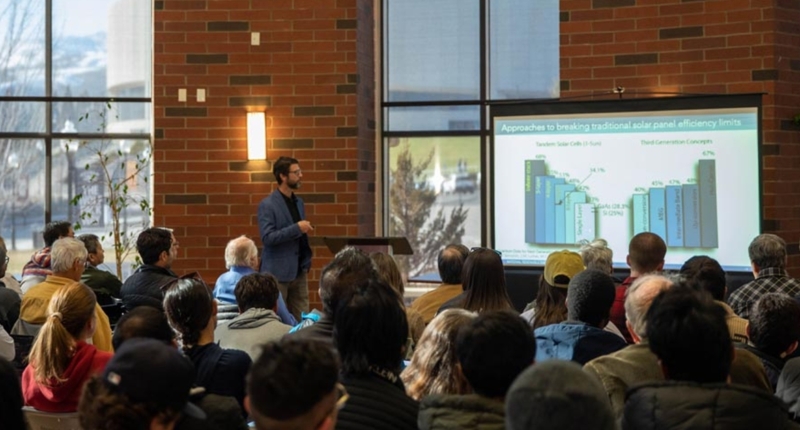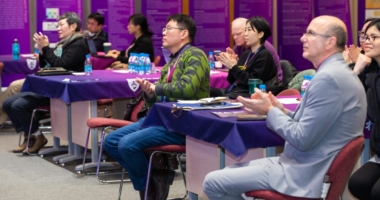Scientists at the National Renewable Energy Laboratory are developing new solar technologies aimed at increasing efficiency and reducing costs. The use of perovskite semiconductors and quantum dot solar cells can retain much more energy in the form of electricity rather than heat, and have properties that are able to improve the efficiency of solar panels. However, these new technologies still face some challenges, such as the environmental implications of various solvents used and the long-term operational stability of the solar panels. Scientists are working to make these new solar technologies last as long as traditional silicon panels, without maintenance. The Energy Solutions Forum at the University of Nevada encourages scientists to pursue climate solutions in their own research, regardless of the field, to make clean renewable energy the norm. The forum’s next event will feature geothermal innovations.
Solar panel scientist Joey Luther from the National Renewable Energy Laboratory (NREL) recently participated in the Energy Solutions Forum at the University of Nevada, Reno. Luther’s research at NREL is focused on improving solar panel efficiency using chemistry and engineering. Luther studies perovskite semiconductors and quantum dot solar cells, and has even combined the two to create perovskite quantum dot solar cells. Today’s commercial solar panels generate heat at the cost of energy efficiency, but both perovskite semiconductors and quantum dot solar cells have unique properties that can retain much more energy in the form of electricity rather than heat.
Perovskites are crystalline structures that can be found in thousands of different compositions. Halide perovskites were discovered to be applicable in solar panel technologies just ten years ago and have since become very popular. Luther specifically studies lead halide organic-inorganic perovskites, which can withstand defects, making manufacturing efficient solar panels much more feasible and potentially able to produce solar panels at a much faster rate, leading to cost savings.
In addition to being efficient, perovskites are also easy to deploy. Researchers were able to put the crystalline semiconductors into a liquid, spread the liquid on a surface, and let it dry, like ink on paper. That layer of perovskite “ink” becomes a useful semiconductor. By combining silicon and perovskite panels, researchers have made perovskite/silicon tandem solar cells with up to 32.9% efficiency.
“It basically allows you to make a panel that generates 50% more electricity than a silicon panel alone just by adding a few extra layers and an ink coating across the top of the device,” Luther said. Luther’s research aims to make solar energy cheaper than traditional fossil fuel electricity. At the beginning of his career, solar was a very small sector of energy production, but it has grown tremendously throughout his career. Luther is excited to be part of the path towards solar becoming more accessible and efficient.
Solar technologies have come a long way in the past few years, but still face several challenges. One of these challenges is the environmental implications of various solvents used and the use of lead in solar panels. However, NREL scientist Joey Luther argues that the proper analysis of the reduction in carbon emissions over a long period of operation, in addition to the makeup of the products and ability to recycle them, is more complex and should be considered.
Another challenge is the long-term operational stability of the solar panels. The solar panels that NREL scientists are working on are low-cost and efficient, but they need to last as long as silicon panels, which typically have warranties of 25-30 years and are pushing for 50 years. This challenge is especially significant for perovskite solar cells, which are facing competition in terms of lifespan. However, Luther has hope that these solar cells will help combat climate change.
The Energy Solutions Forum, which encourages scientists to pursue climate solutions in their own research, regardless of the field, will hold its next event on April 5. The forum will feature Jack Norbeck from Fervo Energy, who will discuss geothermal innovations such as horizontal drilling. Registration for the forum is open via Eventbrite.
Luther believes that there isn’t a single technology that will solve climate change and that even technologies that aren’t used on a mass scale can still be meaningful in the long run. He emphasizes the importance of pursuing clean renewable energy as the norm.
Don’t miss interesting posts on Famousbio










